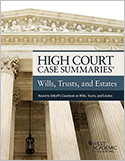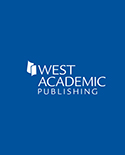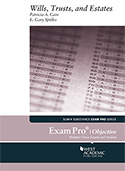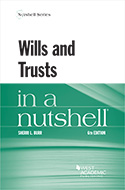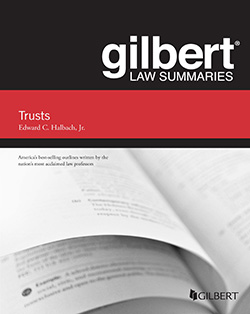
Gilbert Law Summaries on Trusts
Author:
Halbach Jr., Edward C.
Edition:
13th
Copyright Date:
2007
16 chapters
have results for gilbert law summaries on trusts
Chapter One. Introduction 89 results (showing 5 best matches)
- respects: the nature and character of title held by the fiduciary; the duties and powers of the fiduciary; and the remedies available for enforcement. Other bodies of law also deal with special uses of the trust device, such as real estate investment trusts (“REITs”), voting trusts, Massachusetts business trusts, and employee benefit trusts, none of which are dealt with specifically in this Summary.
- An express trust is created as a result of the , by a person or persons having the power to do so, to create that relationship that the law recognizes as a trust. “Trust” terminology need not be used or even known to the persons involved. The required “manifestation” of intent may be found in the settlor’s oral or written words, conduct, or a combination of these, viewed in an overall context. Most matters discussed in this Summary primarily involve express trusts of the active variety, private or charitable, testamentary or inter vivos, revocable or irrevocable.
- interest under common law principles. (The Uniform Commercial Code changes this rule in certain situations. Sale and Lease of Goods Summary.) A wrongful sale of the trust res by a trustee to a bona fide purchaser, however, usually does cut off the equitable interests of the beneficiaries; under common law principles the transfer of legal title to a bona fide purchaser cuts off latent (hidden) “equities.”
- A resulting trust is based on the of a property owner, as distinguished from the actual intention involved in express trusts. It arises by operation of law where an express trust fails in whole or in part or where the beneficial provisions of an express trust are incomplete ( the settlor has failed to make full disposition of the equitable interests). The trustee is then said to hold upon a resulting trust for the settlor or her successors in interest. Therefore, in most instances, it is helpful to think of a resulting trust simply as the consequence of an becoming realized. Closely related is the purchase money resulting trust. (
- Generally, courts are reluctant to give words of condition literal effect where forfeitures on failure of the condition would result. ( Property Summary.) Hence, unless the language makes clear that a condition was intended, a grant will usually be construed as creating a
- Open Chapter
Title Page 31 results (showing 5 best matches)
Gilbert Exam Strategies 45 results (showing 5 best matches)
- References are made throughout this Summary to the Uniform Trust Code (“UTC”), which was promulgated in 2000 by the National Conference of Commissioners on Uniform State Laws. The 1959 Restatement (Second) of the Law of Trusts, referred to in this Summary as the “Second Restatement” or “Rest. 2d,” is being replaced by a new Restatement (“Third Restatement” or “Rest. 3d”). A preliminary volume on the “Prudent Investor Rule” was published in 1992 by the American Law Institute and has been codified directly or by adoption of the 1994 Uniform Prudent Investor Act (“UPIA”) in nearly all states; another three volumes (§§1-92) have now been published. The third of these volumes ends with Chapter 17 (§§90-92), which incorporates, in proper sequence, the Prudent Investor Rule (originally §§227-229 in the Second Restatement and 1992 preliminary volume). The fourth and final volume is now under way.
- Scott on Trusts,
- As a first step, consider whether the relationship that has been created is in fact a trust. Except where the law implies a trust, there must be some effective expression of by the owner of property to create the particular status that the law regards as a trust. The parties’ own expressions of intent are, of course, significant, but also consider:
- Consider whether creditors can reach the trust estate (i) on the theory that the settlor has over the trust, or (ii) on the theory that the trust transfer was a
- on contracts executed by him on behalf of the trust, the effect of any from the trust, and whether the contract creditors can reach this right.
- Open Chapter
Chapter Six. Trust Administration 299 results (showing 5 best matches)
- A trustee signing or endorsing a negotiable instrument “as trustee” of a designated trust is liable as long as the trust is properly identified. The holder of the instrument instead has a direct action against the trust estate ( Commercial Paper & Payment Law Summary)—
- Some statutes authorize corporate trustees to retain their own shares received in trust from the settlor. But they are then frequently prohibited by statute from such shares absent specific authorization to do so in the trust terms. [ Cal. Fin. Code §1561; N.Y. Banking Law §6012(7)] Case law is divided on the question of voting these shares ( if merely retention is authorized by the statute or trust instrument) in the absence of an express provision.
- Legislation in most states explicitly eliminates the personal liability of the trustee as “principal.” (This has not resulted from statutes providing that the trustee is the “general agent” of the trust estate.) Where the common law has been modified by statute, only the trust estate— the trustee in his fiduciary capacity—is liable on contracts properly executed by the trustee if his status as trustee was known to the other party.
- In a noted article first published in 1913, Professor Hohfeld attempted to assign precise meanings to the terms “power,” “duty,” and “right” (along with others) as they apply generally to legal relationships among persons. [Wesley N. Hohfeld, Fundamental Legal Conceptions as Applied in Judicial Reasoning, 23 Yale L.J. 16 (1913)] Although Hohfeldian analysis is useful in this field as in others, courts and commentators in the law of trusts rarely use these terms with such attempted precision; this Summary uses these terms in the customary manner of trust cases and literature.
- Remember that, when in doubt, court instructions may be sought for rulings on law or interpretation of the trust, but not for decisions based on the trustee’s business judgment.
- Open Chapter
Capsule Summary 330 results (showing 5 best matches)
- Constructive and resulting trusts are not based on any real expression of trust intent, but rather upon operation of law ( implied by law or imposed by courts).
- A trustee must understand and follow the terms of a trust and must understand the powers and limitations of the office. The trust instrument ordinarily others. Trust law itself confers on a trustee the powers to carry out the trust, although now many statutes and decisions imply essentially where they have the right to terminate the trust), beneficiaries’ actions may affect a trustee’s authority and obligations.
- A resulting trust is an based on the of a property owner. It arises by operation of law where an express trust fails in whole or in part or where its beneficial provisions are incomplete.
- The Third Restatement and the Uniform Prudent Investor Act advanced a quite different and modernized rule for trust investment law. The so-called “prudent investor” principles now prevail, in one form or another, in the trust law of all states. The “prudent investor” rule judges an investment not in isolation but as a part of the
- The modern trend is to approve trusts for the dissemination of particular but a trust for the promotion of a Trusts for
- Open Chapter
Chapter Two. Elements of a Trust 298 results (showing 5 best matches)
- Where unnamed beneficiaries of a testamentary trust are to be ascertained by a “formula” or description, that identification must be based on “acts of independent significance.” Under this doctrine, a will may dispose of property by reference to acts or events that have significance apart from their effect on dispositions made by the will. ( Wills Summary.)
- At common law, there is no general objection based simply on the trust’s duration. In theory at least, there can be perpetual trusts for private purposes, as long as all interests have properly vested within the period of the Rule. Nevertheless, the duration of the trust may cause some problems if it is to last beyond the permissible period.
- A valid private trust requires beneficiaries capable of enforcing it, and those beneficiaries must be ascertained or ascertainable when the trust is created or assuredly become ascertainable, if at all, within the period of the Rule Against Perpetuities ( Future Interests Summary). The purpose of this requirement of identifiable beneficiaries is, ostensibly at least, to assure that the trust is or will be enforceable, which in turn ostensibly requires or will require persons who are identifiable as beneficiaries or as members of a “reasonably definite and ascertainable class” of beneficiaries. [Rest. 3d §§44-46]
- Suppose the conveyance is “Debtor to Friend in trust to pay the creditors of Debtor.” If this is construed as a trust (some cases hold it is a mere agency), it should be considered a trust for the benefit of Debtor (the debtor-transferor) with power in Friend to pay Debtor’s creditors. The creditors are not beneficiaries and have no right to enforce payment, unless the trust grew out of a creditors’ composition or compromise agreement (perhaps as third-party beneficiaries if the dealings were contractual in nature; Contracts Summary). Otherwise, the trust would be terminable at will by Debtor as sole beneficiary and settlor.
- The trust res may consist of a fractional undivided interest in “one-half ownership of my law library”). [
- Open Chapter
Chapter Three. Creation of Express Trusts 280 results (showing 5 best matches)
- Oral trusts of personal property are valid at common law, but in a few states this has been changed by statute (although legislation requiring a writing for a
- Grantor intends to transfer title to Grantee in trust for Friend. Grantor fails to make adequate delivery of the deed (no effective transfer), but Friend takes possession with the knowledge and consent of all parties. The transfer of possession may render the trust effective. ( Remedies Summary.)
- The testator may also refer to some extrinsic, nontestamentary act, event, or other fact (here, the inter vivos trust) to identify the beneficiaries or terms of a disposition in trust. (Again, Wills Summary.)
- Can a property owner transfer property into a revocable trust and thereby circumvent policies of the law of decedents’ estates (or other policies) restricting testation or imposing obligations on a decedent’s estate? This section addresses the use of a revocable trust to avoid the statutory
- A valid inter vivos trust may be based on a promise enforceable under the law of contracts to create a trust ( hold certain property in trust for B’s children, or as in §408, , where there is an insurance trust). It is not conceptually clear whether such a trust is created presently by the contract (with the promise, a chose in action, as the res) or whether it is to be created later by the transfer (by A or by the insurance company) that could be compelled by court (as a gratuitous promise could not). Also, this type of case is to be distinguished from a present assignment of another’s enforceable promise, which immediately create a trust (of a chose in action); one form of insurance trust is created in this manner by transfer of the
- Open Chapter
Chapter Nine. Trusts Arising by Operation of Law 108 results (showing 5 best matches)
- Grantor conveys two tracts of land to Grantee, while intending to convey only one. Grantee holds the second tract on constructive trust for Grantor, whether Grantee knew of the mistake or not. ( Remedies Summary.)
- One peculiar form of resulting trust, the “purchase money resulting trust,” has little to do with the primary subject of this Summary but is examined in some detail below in order to present a comprehensive treatment.
- Transferor bequeaths “to Transferee in trust to pay the income to Beneficiary for life, and on Beneficiary’s death to transfer the principal to Beneficiary’s then living issue.” Beneficiary dies without having had issue. Because no provision has been made and no interest has been created for the circumstances that have materialized, the property reverts; Transferee holds upon resulting trust for Transferor, her residuary beneficiaries, or, if none (or if the trust was itself a residuary trust), her heirs at law.
- Transferor bequeaths or devises “to Transferee, as trustee” but specifies no beneficiaries or other trust terms, or the will leaves “to Transferee in trust upon such terms as I have or may communicate to Transferee during my lifetime.” Assuming no special circumstances exist (such as actual fraud) requiring a constructive trust for Transferor’s estate or others, it is clear on the face of the instrument that Transferee takes in trust but (under the general rule today) the terms of the trust cannot be proved and cannot be carried out. Transferee holds on resulting trust for Transferor’s estate for the benefit of her residuary beneficiaries or, if none, her heirs at law (
- Constructive and resulting trusts may arise out of situations in which an actual trust intention is present but fails; they are not created by expressions of that intention but rather by operation of law. Thus, these trusts are
- Open Chapter
Chapter Seven. Accounting for Income and Principal 83 results (showing 5 best matches)
- no trust
- In calculating the income that would have been earned on “normally productive property,” the common law looks to the going rate of return on trust investments in the community. Under the 1962 Act, however, the rate is stipulated at 5%. [1962 Act §12(b)]
- In trust accounting the general rule is that the income beneficiary is entitled to on the trust estate . What these “earnings” are, however, may follow the wills rule (above), or—perhaps more often—any interest payable to the trust may commence at the date of the testator’s death.
- The specific rules of trust accounting often differ from general accounting principles because the trust law is influenced by special factors. (Students trained in accounting will sometimes be quite surprised at the trust law’s strange lack of respect for normal financial concepts of “net” income.) For example, there is a tendency for some types of issues to favor income beneficiaries (reflecting the settlor’s probable intent, such beneficiaries usually being closest to the settlor); there will be a tendency in other situations to avoid a forced income distribution of properties or funds likely to be important to maintaining a properly functioning trust estate.
- As indicated, the earnings on the trust corpus during administration of the decedent’s estate are generally allocable to the income account from the testator-settlor’s date of death (even though not payable, of course, until the trustee receives distribution of the trust funds).
- Open Chapter
Chapter Five. Charitable Trusts 140 results (showing 5 best matches)
- . If a trust is not charitable under state law and therefore fails, the attempted transfer to that trust will not receive “charitable” tax treatment; however, the mere fact that a trust is “charitable” under trust law does not assure its treatment as “charitable” for tax purposes. Nor is the fact that a purpose is or is not charitable for tax purposes controlling for purposes of validity or invalidity under state trust law, although a state court may be influenced by tax policy in these matters.
- Clearly a trust for the of the law ( “to support the work of the State X Law Revision Commission”) is charitable, but trusts to bring about a in the law may or may not be.
- When the facts of an exam question set forth a trust with an apparently charitable purpose, do not immediately assume that you have a charitable trust. It is important for you to make a determination of whether the trust is in fact charitable. This determination may be important because the correct answer to your question may turn on the special privileges accorded only to charitable trusts, or the trust’s very validity may depend upon its purpose being classified as charitable. Your initial task then is to determine that the trust meets the requirements of a charitable trust, namely, whether it has:
- A charitable trust is created in the same manner (by will, inter vivos transfer, or declaration) as a private trust, but such a trust is established for a purpose that the law regards as charitable. It is a trust the performance of which will, in the view of the law as interpreted by the courts (rather than merely in the opinion of the settlor), confer appropriate benefits upon
- Charitable trusts are favored by the law and are accorded special privileges not given to private trusts. They are generally construed in a manner that serves to uphold and preserve them ( to limit the purposes to those that qualify as charitable), and they are exempted from some of the restrictions applicable to private trusts.
- Open Chapter
Chapter Eight. Modification and Termination of Trusts 96 results (showing 5 best matches)
- Exam questions concerning the modification and termination of a trust may present issues about the possible existence of an express or implied power of modification or revocation retained by the settlor or granted to the trustee, or may require you to consider the proper scope or manner of exercise of such a power. They may focus on creditors’ rights issues or even involve the possibility of termination of the trust by operation of law. But the most important exam material in this chapter has to do with the ability of courts and beneficiaries to modify or terminate trusts.
- Despite the absence of a reserved power of revocation or modification, a trust may be rescinded or reformed (including to supply a mistakenly omitted power to revoke) on the same grounds as a like transfer free of trust. ( Remedies Summary.) This requires proof of some recognized ground for relief—such as fraud, abuse of confidential relationship, undue influence, or mistake. [Rest. 2d §333] A quite flexible enhancement of the judicial power to reform for mistake is provided in the UTC. [UTC §415—requiring clear and convincing evidence; trusts and reviving the traditional distinction between wills and inter vivos trusts]
- Finally, when the trust estate ceases to exist, the trust terminates by operation of law. Thus, where all trust assets have been consumed or lost, or otherwise cease to exist, the trust likewise ceases to exist. [Rest. 3d §30]
- The trustee has only such power to modify or terminate the trust as is conferred upon him by the trust instrument, expressly or impliedly (or, in the case of a valid unwritten trust, by its provable terms). A power to modify or terminate may also be conferred by trust provision on a beneficiary or third party. [Rest. 3d §64]
- Where the purposes for which the trust was created have been completely fulfilled ( , “to provide such funds as are necessary to pay for my son’s college education”), the trust terminates by operation of law even prior to the expiration date set in the trust instrument if:
- Open Chapter
Summary of Contents 62 results (showing 5 best matches)
Exam Questions and Answers 70 results (showing 5 best matches)
- In cases involving alleged trusts based on , the modern predisposition of courts is to find that precatory words are just that—mere requests or suggestions, and not expressions of trust intent or of obligation. The question then becomes whether there are facts and circumstances that affirmatively indicate the existence of a trust intent, to overcome this judicial reluctance to base a trust upon precatory wording.
- On the other side ( contrary to the alleged trust), a trust result would be inconsistent with the normally inferred intention to treat children equally; if John is found to take his half of the estate in trust, subject to significant obligations to his grandfather, Mary’s provision for him would not be comparable to the provision for her daughter, Martie. Just how disparate the treatment of her children would be if a trust were found would depend on the terms and meaning attached to that intention. Furthermore, this uncertainty itself reinforces John’s argument against finding a trust. Although the question does not ask for a discussion of the precise terms of the trust, the very fact that the language in the will is vague is likely to detract from any allegation that there was an intent to impose binding duties in the form of a trust.
- Does Wilma’s one-third elective share stand on a different footing? In the absence of a statute, most courts have held that it does not— , courts generally hold that a revocable trust be used to circumvent a surviving spouse’s forced share, which is applicable only to the probate estate in most jurisdictions. Gradually increasing case law (and statutes) give some form of special protection to the forced share of a spouse. Many of these cases require a finding that the trust was intended to “defraud” the spouse, but most courts have rejected this highly subjective approach. There is very little other authority (absent legislation) recognizing a special status for a spouse’s forced share with respect to such trust properties. It is fair to say, however, that on the more general question (mentioned in the prior paragraph) of whether a trust is entirely “illusory” and thus invalid, some courts have—without openly saying so—appeared to be more receptive than usual to such a challenge...
- Five years ago on May 1, Jayne Dough executed a written agreement entitled “Revocable Life Insurance Trust” and had her life insurance policies in the face amount of $250,000 made payable to Old Reliable Bank “as trustee under that life insurance agreement executed on May 1, of which I am settlor and said bank is trustee.” As she was permitted to do by the terms of that trust agreement, she amended it three years later. The original terms provided for her brother (her nearest of kin), Joe Dough, to receive the trust income for life, with the trust principal on his death to go outright to Joe’s issue, per stirpes. The amendment merely added a life income interest for Joe’s wife, Josie, if she should survive him.
- Although the jurisdiction involved had (and still has) no pour-over legislation, Jayne’s will, executed two days after her revocable life insurance trust, left her entire estate “to Old Reliable Bank, in trust, to be held by it as a part of that insurance trust established by me on May 1, and to be administered and distributed as provided by the terms of that trust as they exist at the date of my death.” Jayne died two years ago in December.
- Open Chapter
Chapter Four. Transfer of Beneficiary’s Interest 83 results (showing 5 best matches)
- Thus, on the beneficiary’s death, her interest (if not, under the trust instrument, terminated by her death as it usually would be) is subject to the same rules of descent and distribution or wills law as a legal interest in the same property would be, including the elective share rights of a surviving spouse. [Rest. 3d §55]
- trust
- A protective trust may be intended to reach a result somewhat comparable to (and in fact more secure than) the result of a spendthrift trust, but it is logically less objectionable in that the beneficiary can be sure of receiving substantial trust benefits only as long as he keeps his debts paid. On the other hand, these trusts are subject to the criticism that they accomplish indirectly what they could not do directly in some states. The Bankruptcy Code [11 U.S.C. §541(c)(1)(B)] no longer accepts the intended result of protective trusts.
- Beneficial interests in a trust are by the beneficiaries, unless there is a valid provision to the contrary in the trust instrument. Thus, a beneficiary can assign, pledge, or encumber her interest, or even transfer it in trust for another. Also, if the interest is not conditioned on the beneficiary’s survival, it will pass by will or by intestate succession. [Rest. 3d §51]
- The fact that the settlor’s surviving spouse is a beneficiary and declined to exercise a right to reject the testamentary trust and take a statutory share of the settlor’s estate does make the spouse a settlor by purchase so as to allow her creditors to reach her trust interest (according to present case law, but compare Medicare eligibility cases).
- Open Chapter
Index 282 results (showing 5 best matches)
- Publication Date: November 21st, 2007
- ISBN: 9780314181121
- Subject: Trusts and Estates
- Series: Gilbert Law Summaries
- Type: Outlines
- Description: This product contains an outline on trusts. Topics covered include elements of a trust, trust creation, transfer of beneficiary's interest (including spendthrift trusts), charitable trusts (including the cy pres doctrine), and a trustee's responsibilities, power, duties, and liabilities. It also covers duties and liabilities of beneficiaries, accounting for income and principal, power of settlor to modify or revoke, powers of trustee beneficiaries or courts to modify or terminate, termination of trusts by operation of law, resulting trusts, purchase money resulting trusts, and constructive trusts.
